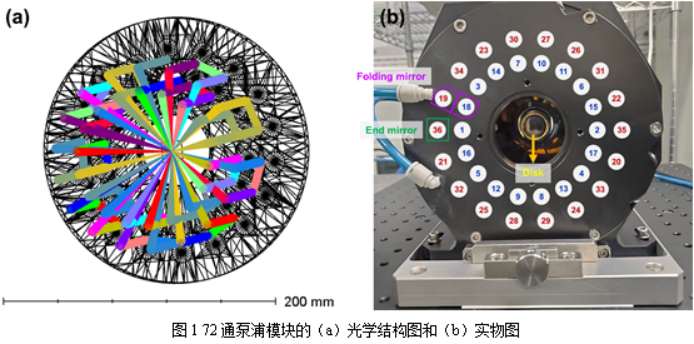High power femtosecond laser has great application value in scientific research and industrial fields such as terahertz generation, attosecond pulse generation and optical frequency comb. Mod-locked lasers based on traditional block-gain media are limited by thermal lensing effect at high power, and currently the maximum output power is about 20 W.
Thin sheet laser uses multi-pass pump structure to reflect the pump light to the sheet gain medium with thickness of 100 microns for high efficiency pump absorption. The extremely thin gain medium combined with backcooling technology greatly reduces the influence of thermal lens effect and nonlinear effect, and can achieve higher power femtosecond pulse output.
Wafer oscillators combined with Kerr lens mode-locking technology are the main means to obtain high average power laser output with pulse width in the order of femtosecond.
FIG. 1 (a) 72 optical structure diagram and (b) physical diagram of the pump module
A team of researchers from the Chinese Academy of Sciences designed and built a Kerr lens mode-locked sheet laser based on the self-developed 72-way pump module, and developed a Kerr lens mode-locked sheet laser with the highest average power and single pulse energy in China.
Based on the principle of Kerr lens mode-locking and the iterative calculation of ABCD matrix, the research team first analyzed the mode-locking theory of thin plate Kerr lens mode-locking laser, simulated the mode changes in the resonator during mode-locking operation and continuous operation, and confirmed that the cavity mode radius at the hard diaphragm will be reduced by more than 7% after mode-locking.
Subsequently, guided by the design principle, the research team designed and built a Kerr lens mode-locked resonator (FIG. 2) based on the 72-way pump module (FIG.1) independently developed by the team, and obtained a pulsed laser output with an average power of 11.78W, a pulse width of 245 fs and a single pulse energy of 0.14μJ at 72 W pumping time. The width of the output pulse and the variation of the intracavity mode are in good agreement with the simulation results.

FIG. 2 Schematic diagram of the resonant cavity of the Kerr lens mode-locked Yb:YAG wafer laser used in the experiment
In order to improve the output power of the laser, the research team increased the curvature radius of the focusing mirror, and fine-tuned the Kerr medium thickness and second-order dispersion. When the pump power was set to 94 W, the average output power was increased to 22.33 W, and the pulse width was 394 fs and the single pulse energy was 0.28 μJ.
To further increase the output power, the research team will further increase the curvature radius of the focused concave mirror pair, while placing the resonator in a low vacuum closed environment to reduce the influence of air disturbance and air dispersion.
Post time: Aug-15-2023






